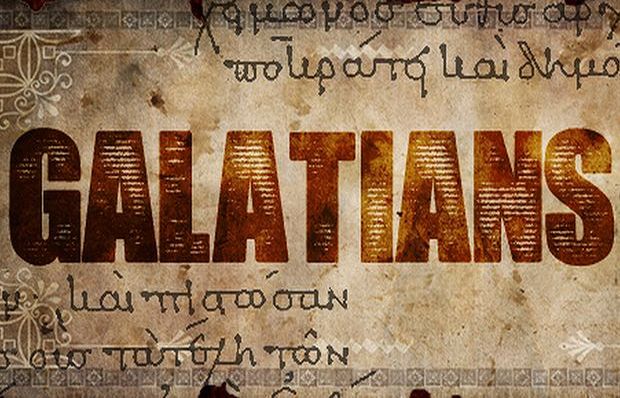Below is the Bible Study written by Jim Rudiger for his Sunday School Class which meets at Third Presbyterian Church, Norfolk, Virginia. It's based on Galatians 3:15-29; 4:1-7.
For most of us there are looks, mannerism or temperament that we inherit from our parents and ancestors. Some are good things and some or bad. My father had a heavy head of hair right up to his death at 97 and my brother inherited his hair. Unfortunately, I took after my mother’s family whose brothers we all bald. So, inheritance becomes a hairy subject for me. But I did beat him out in height. I’m far from a tall guy but my mother’s brothers were all about 5'-2" and my brother got his height from them. Jack isn’t that short, but, he’s about 5'-5". One of my sons is my height while the other is about 6' and he sure didn’t get that from my family. But, Jackie’s aunt was about 6' and her uncle was 6'-4" which apparently popped up in my youngest son. What did you inherit from your folks or ancestors?What we inherit physically or emotionally from our folks is just the starting block. It is how we use it that counts. The same is true if we inherit money. Some people see it as an opportunity to do all the things that they have always wanted to do. After a few years, the inheritance is all used up and they are back where they started. Others will take the money and bury it in the yard and not spend a cent. But, there is a happy medium who will use some of the inheritance to make their life a little easier, put some away for a rainy day or help someone in need.
In today’s lesson Paul talks about inheritance and wills. Let’s see how he uses these things to support his argument that the Galatians had received the true gospel.
Let’s get our brains in gear. Why is Paul writing this letter? Paul is writing to the Galatians because Judaizers had come from Jerusalem to slander Paul and tell the Galatian Gentiles that Paul didn’t know what he was talking about when he gave them the gospel. Out of the goodness of their hearts they had come to steer them in the right direction. What was the right direction as far as they were concerned? If you Gentiles wanted to become Christians then you have to become Jews first and accept the authority of the law. So, what did they have to do to become Jews and accept the law? Get circumcised. What had been Paul’s gospel? Have faith in Jesus Christ as the one who takes away their sins and makes them righteous before God. Following the law or not following the law had nothing to do with salvation.Paul launched into arguments supporting the gospel which he said had been given to him by Christ himself. It all boiled down to freedom. Faith gave them freedom. The law condemned them. He now continues with more examples to illustrate why his gospel of faith makes sense more sense than the Judaizer’s law centered gospel.
Galatians 3:15 Brothers and sisters, I give an example from daily life: once a person’s will has been ratified, no one adds to it or annuls it. 16 Now the promises were made to Abraham and to his offspring, it does not say, “and to offsprings,”as of many; but it says, “And your offspring,” that is, to one person, who is Christ. 17 My point is this: the law, which came four hundred thirty years later, does not annul a covenant previously ratified by God, so as to nullify the promise. 18 For if the the inheritance comes from the law, it no longer comes from the promise; but God granted it to Abraham trough the promise.
Paul is getting a little exasperated with the Galatians as he tries to bring up examples that they might understand. Remember, last week he called them fools. If you have to argue with somebody you had better have a pretty good idea what they believe, so, you can make good points to counter their belief. Ever play the devil’s advocate? What does “playing the devil’s advocate” mean? Putting you in the place of the person you are trying to convince. When my Dad and had a business, I always had the job of arguing our point to engineers and general contractors. I would start out preparing for the meeting by taking the devil’s advocate. I would try to think of all the arguments they would make against my position. So, I would use their arguments to get my father’s reaction to let me know how to fine tune my argument. My father always misunderstood what I was doing and thought I was actually taking the other side’s position. He would get very frustrated and yell that I was forgetting which side I was suppose to be on. But, arguing their positions allowed me to see where their weak points would be and I could develop arguments to put them on the defense. Paul must have used this approach so that he could prepare the Galatians for arguments that the Judaizers would bring up.
What does Paul bring up? Wills. Even back then, Gentiles had wills. If they had a will, could it be easily changed? As far as Paul saw it, a will was chiseled in stone. The only way to change how you wanted your inheritance to go was to throw out the old will and write a new one. To get the Gentile Galatians to understand the covenant between God and Abraham was to equate it to a will. In a way the covenant that God made with Abraham was like a will because God promised something for Abraham’s descendants. That his descendant would be a blessing to the whole world. How long before the law came into being? 430 years later. Did the law tear up the will - the covenant between God and Abraham? Was there a new will enacted? The covenant wasn’t changed and the promises made to Abraham were still in effect regardless of the law.
Good point, Paul. But, obviously Gentiles weren’t physically descended from Abraham, so, how do they fit into the promise? He quotes the covenant that was in Genesis which said, “By your offspring shall all the nations of the earth gain a blessing for themselves.” Abraham’s what? Offspring. What doesn’t it say? Offsprings. It is a singular noun not a plural noun. So, God isn’t referring to all of the physical descendants of Abraham, but, one particular descendant. Who is that one person - that one descendant? Christ. Christ will be the one who will be a blessing to all of the nations of the earth. And this one person comes through the covenant and not the law. There is nothing in the law that mentions the Messiah or Christ.
The bottom line is that God’s promise to Abraham took precedence over the law. So faith in Christ, Abraham's “offspring,” takes precedence over doing the works of the law. Make sense to you?
There is another interesting thing about an inheritance that comes into play. When does an inheritance come into being? When the offspring dies. You see, there can not be an inheritance until after a death. Christ has to die in order for the promises to be given to the descendants.
Galatians 3:19 Why then the law? It was added because of transgressions; until the offspring would come to whom the promise had been made; and it was ordained through angels by a mediator. 20 Now a mediator involves more than one party; but God is one.
21 Is the law then opposed in the promises of God? Certainly not! For if a law had been given that could make alive, then the righteousness would indeed come through the law. 22 But the scripture has imprisoned all things under the power of sin, so that what was promised through faith in Jesus Christ might be given to those who believe.
Paul has made good arguments so far. But he knows there may be a question still in their minds. What is that question? What is the purpose of the law? What does Paul say the answer is? Transgressions. What are transgressions? Sins. The law lets us know what sin is. That is exactly what Paul says in his letter to the Romans, “for through the law comes a knowledge of sin.” Does knowing what sin is stop us from sinning? Ever get a speeding ticket and while you’re sitting in the car waiting for the patrolman to come to your window, what questions come to your mind? How could I have been so dumb? Why didn’t I lighten up on the pedal? You didn’t speed because you didn’t know the speed limit. You sped because you thought you might get lucky and not get caught. Will you never speed again?Another thing, did God give the law directly to the people? The law went to Moses and then to the people. Paul even hints that the law went from God to angels and then to Moses. In other words a lot of go between were used. How did Abraham get the covenant? Directly from God. The law didn’t have the authority of coming directly from God to man. Now with Christ, God was connecting directly with the people just as he had with Abraham. No middle man needed like the law needed. Paul reminds the Galatians that nobody has ever been made righteous by obeying the law. You can only be righteous by having faith in Jesus Christ.
Galatians 3:23 Now before faith came, we were imprisoned and guarded under the law until faith would be revealed. 24 Therefore the law was our disciplinarian until Christ came, so that we might be justified by faith. 25 But now that faith has come, we are no longer subject to a discplinarian, 26 for in Christ Jesus you are all children of God through faith. 27 As many of you as were baptized into Christ have clothed yourselves with Christ. 28 There is no longer Jew or Greek, there is no longer slave or free, there is no longer male and female; for all of you are one in Christ Jesus, 29 And if you belong to Christ, then you are Abraham’s offspring, heirs according to the promise.
Paul fine tunes his use of the law. What does the law do to us? If we break the law and lose at our trial, it’s like we are in prison with armed guards at the door. So the law not only judges us, but puts us in jail. And how long are we in jail? Until faith is revealed. And what was that faith? So, our “get out of jail” card is our faith in Christ.
Paul then says that the law was their disciplinarian until Christ came. In Paul’s day, the rich would take a trusted slave and give him the job of raising their child. The slave would punish the child when necessary, teach him his manners and morals and even instruct him in the religion practiced by the family. When the child was old enough to attend school, the slave would take him to school. He wouldn’t act as the teacher but prepared the child for the teacher. For most of us today, we had to do things that the slave would have been responsible for. So the slave then and we today prepare the child for something better. Paul says that the law was given to do what? Lead people to something better - Jesus Christ.
The law prepared the people by letting them recognize sin and by, doing that, making them realize that they were the ones doing the sinning. But once they have met Christ and acknowledged their sin, do they really needed something to tell them what sin is? No. Therefore, they don’t have any further need for the law. For years I ran a basketball clinic for little boys and girls. Our job was to prepare them for the next level of play. When they grew too old for the clinic, then we had done all we could do for them and they moved up to the next level. They really didn’t need us anymore because something better waited them. That is how the law is. It didn’t take them all the way. Only prepared them for the next step.
Paul tells us that being in Christ makes us children of God. What does it mean to be a child of God? What benefits come to us by being a child of God? (1) Part of a family. (2) We gain an inheritance (salvation). (3) We are loved by a perfect father. (4) Gives us authority. Being a child of God was a unique experience for the Jew. Following the law, a person could never be a son; only a servant. How close was Moses to God? In Joshua 1 verse 2, the Lord speaks to Joshua and says, “My servant, Moses, is dead.” Scripture tells us that David was loved by God. Yet God called David his servant. Just think about it. As a child of God, you are more important than Moses or David. And the law couldn’t put Moses or David in that special relationship and the law never claims that it will do that for a person. To be a son or daughter of God requires that we possess righteousness, God’s righteousness. That righteousness comes only through faith in Jesus Christ. It doesn’t come through our church attendance, how much we give, how many hours we spend praying nor how we were baptized. The righteousness that allows us to be adopted by God comes through Christ.Baptism is a big thing for Christians. Is it strictly a Christian thing? Actually, baptism was a Jewish custom first. If a man wanted to become a Jew, he had to do three things. First, he had to be circumcised. Then he had to offer a sacrifice. Finally, he was baptized. Baptism to the Jew consisted of removing all the hair from your body - not a big thing for me. Your fingernails and toenails would be clipped short. The man would be completely stripped and kneel in the water. It was important that the water touch all parts of his body. There would be three men present called the “fathers of the baptism” and they heard the man’s confession of faith. Now, while the man was still in the water, the three men would read parts of the law, encourage him and pronounce benedictions upon him. When the man rose out of the water, he was now a member of the Jewish faith. He had been baptized into the faith.
Paul tells us that we are not only now baptized into Christ, but, we have what? Put on or clothed ourselves with Christ. Does being clothed with Christ mean anything to you? Have you ever heard that clothes make the man? Paul is saying that having Christ on you makes you look like Christ to others. Most men recognize the maroon and gold uniforms of the Washington Football Team. From a distance, we can’t recognize the player, but, we sure know whose team he’s playing for. Being clothed in Christ lets people know what team we are playing for.
Even more important than how others view us, is the fact that when God sees us, he sees us all clothed in Christ. And if he sees us as being clothed in Christ, God sees us as perfect. Now, who hasn’t always wanted to be the perfect child? Folks, being clothed in Christ makes us perfect in the eyes of our Father in heaven.
Now if all believers are clothed in Christ, then we are all like the Washington team when viewed from the Goodyear blimp. We all look the same. There is no differences between believers. Paul uses three contrasts to illustrate that point. What were they? Jew or Greek (read that as Gentile), slave or free, and male or female. Paul picked these three contrasts on purpose. Every morning, the pious Jewish man would pray to God, “Thank you Lord that you didn’t make me a Gentile, a slave or a woman.” Paul takes this prayer and turns it on it’s ear. He writes that God doesn’t see any difference between a Jew and Gentile, a slave and free man, or a man and a woman. They are all precious in his sight. So, from the disunity of the Jewish man’s prayer, Paul forged unity. From separation, Paul brought everybody together in fellowship.
Galatians 4:1 My point is this: heirs, as long as they are minors, are no better than slaves, though they are owners of all the property; 2 but they remain under guardians and trustees until the date set by the father. 3 So with us; while we were minors, we were enslaved to the elemental spirits of the world. 4 But when the fullness of time had come, God sent his Son, born of a woman born under the law, in order to redeem those who were under the law, so that we might receive adoption as children. 6 And because you are children, God has sent the Spirit of his Son into our hearts crying, "Abba! Father!" 7 So you are no longer a slave but a child, and if a child then also an heir, through God.
In Paul’s day, becoming an adult was far different than it is today. What defines becoming an adult today? Back then, there were rituals and kind of a “rite of passage.” For the Jews, when a boy became 12, he was taken to the Temple where he became a “son of the law”. The father would get up and pray, “Blessed are thee, Oh God, who has taken from me the responsibility of this boy.” A lot of us have wanted to find somebody else be responsible for our kids, but, have been too afraid to assign that job to God. The boy declared that from now on he would keep God’s commandments and would bear the responsibilities for all of his actions toward God. At 12, the boy was drawing a line in the sand marking the end of his childhood and the beginning of his adulthood.
How does Paul see a child who inherits something from his deceased parents? You aren’t old enough to make the decisions you will need to make, so, others have to take over for you. They’ll make decisions that effect you without you agreeing to them. If that is where you are, kiddo, then you’re no better than a slave. Paul says that you can be a rich and powerful man’s son, but, as a baby you have to be cared for just like a slaves son. Joe Biden, at one time had his diapers changed like everybody else. No matter how powerful the father was, the son had no authority as a child. Slaves could order the child around and the child was expected to obey. In a few years, the boy becomes a man and then the slaves will be taking orders from him. How long will the boy remain a boy? Until the father says it is time. It is the father who determines when the boy has matured enough to be called a man.
Paul writes that same thing happened with the law. During the childhood of Israel, the law was there to discipline them, to teach what is right and what is wrong. When they had grown mature enough, then God, the Father, decided that the time was right. That is when he sent Christ. And God had two reasons for sending Christ. What were they? (1) to redeem those under the law; and (2) that we might be adopted as a child of God. This adoption literally meant, in Paul’s day, that the child is capable of understanding authority and responsibility. In other words, the child is mature. Therefore, a believer is then placed in the family of God as a full grown son capable of understanding God’s truth.
God sent the Spirit into their and our hearts to call out what? Abba! Abba is the way Jesus spoke to God. For the Jews Abba was an affectionate way of saying father - like saying daddy. Paul recognizes that he is speaking to Gentiles who grew up using Greek, so, he adds the Greek word, father. He wanted to make sure they understood the special relationship that they have with God. They have had their hearts filled with the Spirit of God’s Son and it is that Spirit deep within in them that allows them to call out to God in the same way Jesus did, Abba - Father.
Got your will written? Know who you’re going to leave Grandmomma’s prized baby doll to? Decided who is going to inherit all of the kid's homework papers from elementary school stacked up in the attic? Big decisions to make. While we are stuck on what others will inherit, our own inheritance is set. No codicils added. No changing of what we are to get it. You see, Christ has guaranteed that our faith in him will open the way to an eternity of righteousness before a loving Father.
Prayer: Father, close our minds to the world’s clamor for new laws to separate us from you. Give us the comforting knowledge that all that was needed has been done in the crucifixion and resurrection of our Lord and Savior, Jesus Christ. In Christ name we pray, Amen.








No comments:
Post a Comment